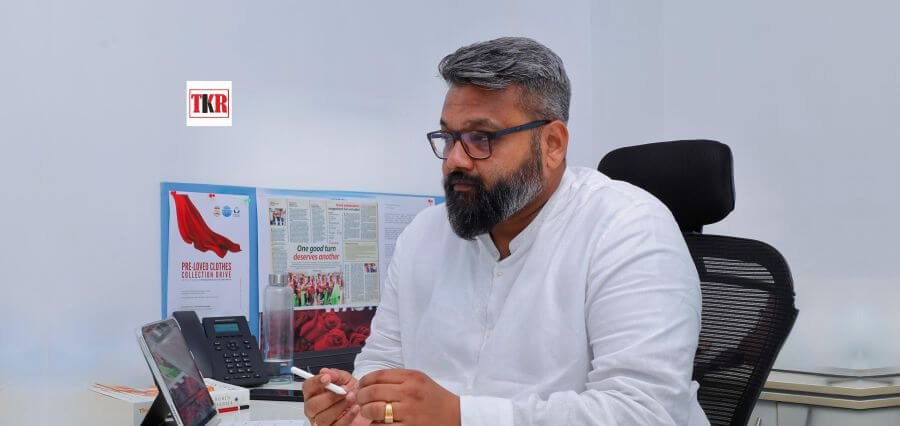V.R. Hari Balaji views his professional journey more as the situations that called for his presence, courage, and undivided belief, and not from the lens of accolades or titles. He was not on his journey to sleek boardrooms and those of following detailed plans. His story occurs amidst human suffering, especially the Kerala floods. As a motivator spurred by a disaster, an individual easily evolved into a professional undertaking that brings together emergency aid, connections among agencies, and academic success. He goes beyond that of a leader; His responsibilities are to connect siloed systems, develop strategic partnerships, and use his skills in areas where the need for agility is at its maximum.
For Hari, the defining moments came not from applause but from silence—those long nights in remote relief shelters where solutions had to be carved out of scarcity. Off the radar that media focused on in one sweep of the moment, he realised that power is not the ingredient for leadership; purpose is. According to his lens, what was important about a crisis was not so much acting fast, but taking advantage of the moment to design a greater, firmer radiance. He did not get lost in the disorder; rather, he distilled insights from it and formed systems that would endure and overcome the impact of disasters. His path was peculiar and with a mission, unlike random selections. It was a process defined by a distinct purpose to provide an immediate, urgent need.
From Camps to Classrooms, and Beyond
V.R. Hari Balaji’s trajectory was shaped not by abstract ideals but by lived experiences in real-world crises. His initiation into humanitarian leadership began in the relief camps of Kerala, a place devoid of luxuries but full of lessons. There, he didn’t carry titles—he carried tools: maps, strategies, and above all, conviction. The frontline exposed him to the truth that disaster response wasn’t just about reacting; it was about building structures that pre-empt and protect. His leadership has since walked hand-in-hand with vulnerability, from cyclone-battered villages in Odisha to the anxiety-ridden helplines of COVID-19 India.
In every region he worked, he absorbed cultural nuances, built trust with grassroots workers, and earned the confidence of senior officials—all while ensuring the most vulnerable voices were included in the room. From the forests of the Northeast to the floodplains of Bihar, Hari operated with one guiding question: “How do we ensure no one is left behind when disaster strikes?” It was this question that led him to develop templates and strategies tailored for communities often invisible in mainstream policy discourse. The classroom, for him, became not a refuge from fieldwork, but a site of reflection and replication—a space to turn scattered insights into structured frameworks.
Leadership Rooted in Empathy and Precision
Amid the cacophony of emergency alarms, policy debates, and agency coordination, Hari Balaji centres himself through three immovable values: empathy, structure, and impact. To him, empathy is not a feel-good accessory—it is a leadership imperative. When standing on crumbling bridges or coordinating fragmented health systems, empathy shapes decisions that are not only timely but humane. Structure ensures those decisions lead to sustainable outcomes. And impact? It’s the compass that ensures each move is meaningful, measurable, and scalable.
In moments of operational gridlock or mass panic, his calm yet firm demeanour often becomes the glue that holds fragmented teams together. His leadership style balances heart and head—he listens before he acts, assesses before he allocates, and steps back when others must step forward. Empathy, in his vocabulary, does not mean sentimentality—it means strategic sensitivity to context. Structure, to him, means protocols that function without the crutch of charisma. Impact isn’t about optics—it’s about outcomes that embed resilience into the very DNA of systems. This alignment of values transforms temporary relief into long-term recovery, creating models of leadership desperately needed in an increasingly unstable world.
Innovation Through Relevance, Not Novelty
While innovation is often linked to technology, Hari Balaji redefines it as relevance in action. His version of innovation involves adapting faster than crises evolve. Whether it’s co-creating training modules with field workers or simulating disaster drills down to the sound of the last siren, innovation is about preparedness and foresight. His academic pursuits are not isolated from fieldwork—they complement it, ensuring that theory is never divorced from ground reality.
What makes his innovation model unique is its rootedness. He doesn’t chase what’s new—he refines what works. From using vernacular content to enhance disaster education to incorporating gender-sensitive modules in training, his interventions are deeply contextual. He recognises that for innovation to be accepted, it must feel familiar yet empowering. He also believes that innovation must be shared—it must be collaborative, co-owned by the people it aims to serve. By keeping feedback loops open and iterative, his work becomes a living system, capable of evolving with time and testing. His innovation is not disruption for disruption’s sake—it is meaningful evolution driven by lived wisdom.
Agility as the New Competence
When disasters strike, there’s no time for deliberation—only for decisions. Hari Balaji understands this intimately. His career is a blueprint in agility, where the ability to shift gears is not just an asset but a necessity. Whether it’s recalibrating public health interventions in a lockdown or pivoting strategies for cyclone recovery, he brings a balance of urgency and thoughtfulness. His work with global agencies like Care India, RedR, UNICEF, Sphere India, and UNFPA attests to his ability to lead across contexts.
He treats every scenario not just as a logistical challenge but as an opportunity to refine systems for the future. Agility, for him, means readiness without rigidity—having a structure that adapts without collapsing. It involves reading signals early, mobilising networks quickly, and responding in ways that are both immediate and strategic. His agility is anchored in deep preparedness: stakeholder mapping, pre-trained responders, and context-aware communication. In volatile environments, he is both the designer and executor of rapid but informed transitions. His presence often serves as a stabilising force, a reminder that flexibility, when grounded in purpose, becomes resilience.
Recognitions Beyond the Limelight
To Hari Balaji, awards are reminders—not destinations. The Humanitarian Award 2024–2025, Super Hero Award (Researcher Category), Harit Ratna by the US Consulate, Certificate of Appreciation – CSR & HR Awards 2025 by Women’s League Foundation and Bhale Bharat Award of Excellence by Indian Science Monitor are milestones, but not the motivation. The moments that anchor him are quieter: a tribal elder’s gratitude, a frontline responder saving lives through a protocol he helped design, or the sustained trust of communities long after the media leaves.
What moves him most is not the recognition by institutions, but the transformation witnessed in people—young volunteers choosing careers in development, communities organising their disaster plans, and policymakers shifting their priorities after consultations. He views accolades as validations of values, not vanity. They are symbolic affirmations that human-centred systems matter and that persistence does pay off. Yet, Hari remains cautious of placing too much importance on awards. For him, the real reward lies in sustainability: in seeing the invisible become visible, and the vulnerable become vital parts of the solution ecosystem.
Turning Challenges into Connection
Leading in chaos demands more than competence—it requires connection. Hari Balaji has stepped into bureaucratic gridlocks, politicised spaces, and disaster-struck communities with a singular goal: to create coherence where confusion reigns. He doesn’t impose solutions—he co-creates them. His approach of lateral thinking, cultural sensitivity, and system mapping allows him to bridge divides, whether institutional or interpersonal.
His ability to read both rooms and landscapes allows him to mediate effectively between policy and people. Whether he is facilitating inter-agency collaborations or decoding policy language for tribal leaders, he builds not just agreements but relationships. His strategy is not to overpower resistance but to convert it into rapport. When others retreat due to mistrust or inertia, he moves in with openness, with data, with empathy. That’s how confusion transforms into clarity, and silos turn into synergy. In Hari’s world, every conflict is a conversation waiting to happen—and every barrier is an invitation to build a bridge.
Redefining Success Through Legacy
To most, success is recognition. To Hari Balaji, success is relevance that endures. When protocols operate autonomously, when communities self-mobilise in emergencies, and when governments adopt frameworks he helped shape, he sees success. It’s not about being remembered; it’s about creating systems that remember their purpose long after the creator has stepped aside.
He dreams of a world where emergency response is not a scramble, but a seamless process embedded into the social fabric. His idea of legacy is not institutional memory—it’s community empowerment. His success is when field officers confidently train others using the toolkits he developed, when mothers feel equipped to protect their families during floods, and when policymakers draft laws that reflect the lived realities of marginalised groups. His frameworks don’t seek ownership—they invite stewardship. True success, for him, is when systems are so inclusive and functional that they no longer need him at the centre.
Lessons for Aspiring Leaders
For the next generation of leaders, Hari Balaji offers clarity: You don’t need permission to lead, you need purpose. Real leadership is not about commanding attention—it’s about cultivating alignment. His advice is anchored in experience:
- Lead with empathy—not ego.
- Master the systems before critiquing them.
- Be relentless in service—and silent in success.
- Treat communities not as passive recipients but as co-creators.
He encourages young changemakers to observe deeply before acting, to understand systems before disrupting them, and to practice humility as a strategy, not just a virtue. He challenges them to see leadership as responsibility, not recognition—and to cultivate resilience not just in communities, but in themselves. His mantra is clear: impact doesn’t wait. Start where you are. Serve without conditions. And build frameworks so robust that they liberate others to lead.
Vision for a Resilient Future
Looking forward, Hari Balaji’s compass remains unwavering: resilience, equity, and sustainability. His goals are ambitious but urgent:
- Develop community-trusted frameworks that can scale nationally.
- Foster leadership at grassroots levels through policy literacy and disaster preparedness.
- Mentor a new wave of humanitarian professionals who are as rigorous in thought as they are in empathy.
He envisions institutions that no longer need to scramble during crises because they are built on inclusion, anticipation, and trust. He aspires to democratise resilience, making it accessible not just to cities, but to the most forgotten hamlets. He aims to catalyse a shift in how India, and perhaps the world, thinks about disaster preparedness—not as a reactive sector but as a proactive right. His journey is far from over, but his direction is clear: toward a world where dignity, data, and design come together in service of humanity.





